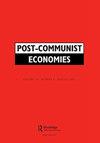Windfall revenues and structural balance in the Czech Republic
IF 1.8
3区 经济学
Q2 ECONOMICS
引用次数: 0
Abstract
ABSTRACTAnalysis of the structural balance is a crucial element for assessing the character of fiscal policy. However, this approach entails potential shortcomings, where some tax revenues may be affected by the development of variables other than the economic cycle. This can lead to skewed assessments of the fiscal effort because of the existence of windfall revenues/losses. We address this issue and identify windfall revenues in the Czech Republic. First, we calculate the elasticities of individual taxes on relevant macroeconomic variables. Then we test these variables for sensitivity to the economic cycle. The absence of such sensitivity suggests the possibility of windfall revenue. Further, we quantify the volume of the windfall revenue for 2007–2019. We found that the development of the rental market is the main factor influencing windfall revenue in the Czech Republic. The windfall revenue range is around 0.15% of GDP per year.KEYWORDS: Windfall revenuestax elasticitiesstructural balancefiscal effort AcknowledgmentsThe present paper was supported by the long-term institutional scientific research funding scheme in the Faculty of Finance and Accounting, Prague University of Economics and Business (IP 100040).Disclosure statementNo potential conflict of interest was reported by the author(s).Notes1. A typical example is the MTO (Medium Term Objective) rule in the EU. If a member state does not reach the MTO value, it must show a fiscal effort of at least 0.5% of GDP per year.2. A detailed description of the estimation methodology is available at https://www.mfcr.cz/cs/legislativa/metodiky/2020/metodika-odvozeni-vydajovych-ramcu-statn-39442/. The results, including the data used, are available at https://www.mfcr.cz/cs/verejny-sektor/makroekonomika/makroekonomicka-predikce/2022/makroekonomicka-predikce-listopad-2022–492723. Income from the sale of real estate is exempt in the case of holding by the taxpayer for more than ten years; until 2020, the time test was five years. If the real estate is used for the living of the taxpayer or the living of his family members, the time test for exemption of the income is two years. The time test can be even shorter if the money received from selling the real estate is used for the own living of the taxpayer or his family again. The closeness of the relationship of the family members is specified within the law. If taxable, the purchase price can be considered as a taxable expense up to the amount of taxable income, similar to selling shares.Additional informationFundingThe work was supported by the Prague University of Economics and Business.捷克共和国的意外收入和结构平衡
摘要结构平衡分析是评价财政政策特征的重要内容。然而,这种方法有潜在的缺点,其中一些税收可能受到经济周期以外的变量发展的影响。由于存在意外收入/损失,这可能导致对财政努力的歪曲评估。我们解决了这个问题,并确定了捷克共和国的意外收入。首先,我们计算了个税对相关宏观经济变量的弹性。然后我们测试这些变量对经济周期的敏感性。缺乏这种敏感性意味着有可能获得意外收入。此外,我们量化了2007-2019年意外收入的数量。我们发现租赁市场的发展是影响捷克意外收入的主要因素。意外收入范围约为每年GDP的0.15%。本文得到了布拉格经济与商业大学财务与会计学院(IP 100040)长期机构科研资助计划的支持。披露声明作者未报告潜在的利益冲突。一个典型的例子是欧盟的MTO(中期目标)规则。如果一个成员国没有达到MTO值,它必须显示出每年至少占GDP 0.5%的财政努力。估算方法的详细描述可在https://www.mfcr.cz/cs/legislativa/metodiky/2020/metodika-odvozeni-vydajovych-ramcu-statn-39442/上获得。结果,包括使用的数据,可在https://www.mfcr.cz/cs/verejny-sektor/makroekonomika/makroekonomicka-predikce/2022/makroekonomicka-predikce-listopad-2022 -492723获得。纳税人持有房地产10年以上的,免征出售所得;到2020年,时间的考验是5年。如果房地产用于纳税人的生活或其家庭成员的生活,免税的时间标准为2年。如果出售房地产所得的钱再次用于纳税人或其家人的生活,则时间可以更短。法律规定了家庭成员之间的亲密关系。如果应纳税,购买价格可以被视为应纳税的费用,不超过应纳税所得额,类似于出售股票。这项工作得到了布拉格经济与商业大学的支持。
本文章由计算机程序翻译,如有差异,请以英文原文为准。
求助全文
约1分钟内获得全文
求助全文
来源期刊

Post-Communist Economies
ECONOMICS-
CiteScore
4.90
自引率
18.20%
发文量
21
期刊介绍:
Post-Communist Economies publishes key research and policy articles in the analysis of post-communist economies. The basic transformation in the past two decades through stabilisation, liberalisation and privatisation has been completed in virtually all of the former communist countries, but despite the dramatic changes that have taken place, the post-communist economies still form a clearly identifiable group, distinguished by the impact of the years of communist rule. Post-communist economies still present distinctive problems that make them a particular focus of research.
 求助内容:
求助内容: 应助结果提醒方式:
应助结果提醒方式:


